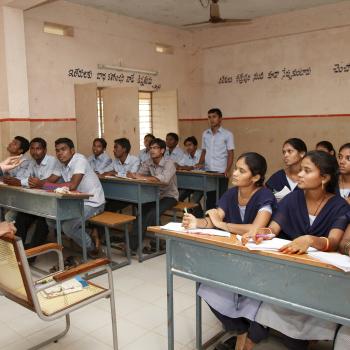
We are delighted to announce that we will be conducting a classroom observation sub-study using methods developed by researchers at the University of Virginia to explore what aspects of classroom environments and teacher-student interaction make for the most effective learning in Indian secondary schools.
This classroom sub-study aims to enrich our knowledge of interactions between teacher and students at the classroom level using standardized methodology (CLASS). The sub-study combines interviews with teachers alongside the CLASS method of scoring emotional, instructional and organizational domains in the classroom. This mixed methods approach will be taken to 25 schools within our India study communities (across the states of Andhra Pradesh and Telangana) covering approximately 10% of the schools covered by Young Lives’ 2016-17 secondary school survey.
Young Lives Lead Education Researcher Caine Rolleston explains why we are pursuing this research now:
“Education in India is highly unequal in terms of outcomes, but we know much less about the processes which explain this. Given the availability of new data from Young Lives on learning levels and school effectiveness, it will be possible to investigate from the inside (of the classroom) the practices which are linked to better learning progress across a range of school contexts. We expect this research to contribute new insights towards unpacking ‘the black box’ of successful teaching and learning in the world’s largest education system.”
Over the 15-year course of Young Lives, exploring the quality and nature of children’s education has been at the fore of research interest. The team’s current focus is based on recognition that secondary education in particular is crucial to breaking the intergenerational transmission of poverty in India and other developing countries (World Bank, 2009).
We have already collected information about schooling and levels of caregiver education through household surveys conducted with both our Younger and Older cohorts across 5 cycles and through primary and secondary school effectiveness surveys. Findings based on this research highlight that while high levels of enrolment are seen across all four study countries (Ethiopia, India, Peru and Vietnam) this is not matched with a significant quality improvement.
The classroom observation sub-study seeks to explore this mismatch and determine some of the teacher and classroom factors associated with greater learning in India, as measured by children’s levels of academic achievement in mathematics and English.
We will publish and disseminate our findings in India at state and national level in 2018 and the data will be publicly archived with the UK Data Service in June. For updates, please follow us @yloxford #YLEducation

We are delighted to announce that we will be conducting a classroom observation sub-study using methods developed by researchers at the University of Virginia to explore what aspects of classroom environments and teacher-student interaction make for the most effective learning in Indian secondary schools.
This classroom sub-study aims to enrich our knowledge of interactions between teacher and students at the classroom level using standardized methodology (CLASS). The sub-study combines interviews with teachers alongside the CLASS method of scoring emotional, instructional and organizational domains in the classroom. This mixed methods approach will be taken to 25 schools within our India study communities (across the states of Andhra Pradesh and Telangana) covering approximately 10% of the schools covered by Young Lives’ 2016-17 secondary school survey.
Young Lives Lead Education Researcher Caine Rolleston explains why we are pursuing this research now:
“Education in India is highly unequal in terms of outcomes, but we know much less about the processes which explain this. Given the availability of new data from Young Lives on learning levels and school effectiveness, it will be possible to investigate from the inside (of the classroom) the practices which are linked to better learning progress across a range of school contexts. We expect this research to contribute new insights towards unpacking ‘the black box’ of successful teaching and learning in the world’s largest education system.”
Over the 15-year course of Young Lives, exploring the quality and nature of children’s education has been at the fore of research interest. The team’s current focus is based on recognition that secondary education in particular is crucial to breaking the intergenerational transmission of poverty in India and other developing countries (World Bank, 2009).
We have already collected information about schooling and levels of caregiver education through household surveys conducted with both our Younger and Older cohorts across 5 cycles and through primary and secondary school effectiveness surveys. Findings based on this research highlight that while high levels of enrolment are seen across all four study countries (Ethiopia, India, Peru and Vietnam) this is not matched with a significant quality improvement.
The classroom observation sub-study seeks to explore this mismatch and determine some of the teacher and classroom factors associated with greater learning in India, as measured by children’s levels of academic achievement in mathematics and English.
We will publish and disseminate our findings in India at state and national level in 2018 and the data will be publicly archived with the UK Data Service in June. For updates, please follow us @yloxford #YLEducation

